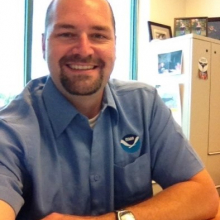IN THIS SECTION
Whale disentanglement is complex and dangerous. It involves small boat handling, ropes under high tension, sharp blades and panicked wild animals. There are safety and legal protocols, and a number of detailed assessments must be made including condition of the animal, nature of the entanglement, weather and conditions, and available resources.
The IWC brings together the leaders of established national disentanglement programmes. They share their knowledge and expertise to develop best practice protocols which are used to train nominees and build professional and effective response capacity in other parts of the world where entanglements occur.

David Mattila
The Expert Panel is coordinated by David Mattila.
David co-ordinates both the Expert Panel and the Global Whale Entanglement Response Network.
Read more

Paul Cottrell - Canada
Paul Cottrell is the Pacific Marine Mammal Coordinator for British Columbia, based in Vancouver, BC.
Read more

Wayne Ledwell - Canada
Wayne Ledwell runs the whale disentanglement assistance programme for the Newfoundland Labrador Region.
Read more
He also manages the entanglement capacity building programme and the programme of training workshops. He has studied whales throughout the world’s oceans and invented some of the techniques now used to release entangled whales. He has also been involved in establishing the USA’s regional entanglement response networks. He is duty stationed at partnering NGO, the Center for Coastal Studies (CCS), in Provincetown, Massachusetts, where he is shared staff with the IWC. For information about CCS, please click here.
For information on British Columbia’s entanglement response, click here.
One of his specialities is working closely with fishers. This work has released hundreds of whales from gear and saved countless dollars in lost gear and downtime. He has spent his lifetime on the ocean and has worked with tangled whales for over 20 years, 14 of those leading Tangly Whales Inc. For information on Newfoundland and Labrador’s entanglement response, please click here.

Dr Frances Gulland - USA
Dr Frances Gulland is Senior Scientist at the Marine Mammal Centre, California, where she has been actively involved in veterinary care...
Read more

Scott Landry - USA
Scott Landry directs the Marine Animal Entanglement Response (MAER) program at the Center for Coastal Studies, in Provincetown Massachusetts.
Read more

Ed Lyman - USA
Ed Lyman has over 20 years experience in marine mammal response.
Read more
... and rehabilitation of stranded marine mammals and research into marine mammal disease since 1994. In 2010, President Obama nominated Dr Gulland to serve as a federal government Commissioner at the US Marine Mammal Commission with a focus on the protection and conservation of marine mammals. For information on the Marine Mammal Centre, California click here. For more information on the USA’s Marine Mammal Commission, click here.
Scott trained with David Mattila and Stormy Mayo starting in 1999, later helping to coordinate and train responders for the Atlantic Large Whale Disentanglement Network. The MAER team responds to entangled whales and sea turtles off southern New England, a region with a diverse and high number of entanglement sightings, year-round. For more information about the MAER program, please click here.
He is presently the Hawaiian Islands Humpback Whale National Marine Sanctuary’s Resource Protection Specialist, where he coordinates a community-based network response to entangled large whales. He also assists NOAA Fisheries coordinate large whale entanglement response in Alaska and the US West Coast. Ed also works with fishermen to come up with ‘whale-safe’ gear and fishing practices that might reduce entanglement risk. Click here for more information on Hawaii’s entanglement response efforts, and here for information on Alaska’s work.

Dr Michael Moore - USA
Dr Michael Moore is the Director of the Marine Mammal Center at the Woods Hole Oceanographic Institution, Massachusetts.
Read more

Jamison Smith - USA
Jamison Smith is the Atlantic Whale Entanglement Response Co-ordinator with NOAA Fisheries for the US Eastern Seaboard.
Read more
His research interests include the forensic analysis of marine mammal mortalities, especially in regard to the accurate diagnosis of perceived human impacts and the prevalence of zoonotic agents, interaction of natural and manmade impacts on fish and marine mammal stocks, marine mammal diving physiology and the development of systems to enhance medical intervention with large whales. For more information on his work, please click here.
He is the point of contact for this public-private partnership, which includes fishermen, conservationists, and state/federal agencies. He lectures widely on entanglement mitigation and response, and marine mammal health, and has assisted in the rescue of well over a hundred marine mammals (including manatees while working in Florida). He has worked on numerous collaborative research projects, ranging from feeding ecology of humpback whales on Stellwagen Bank National Marine Sanctuary in New England, to humpback whale entanglement mitigation and response off East Africa. For more information, please click here.
Latest Tweets

International Whaling Commission
Suite 2, First Floor, Victory House, Vision Park, Histon, Cambridge, CB24 9ZR
+44 (0) 1223 233 971
secretariat@iwc.int
Subscribe to the IWC Mailing List